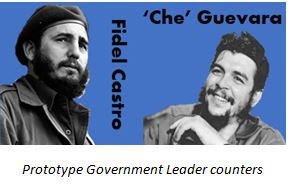The rules and images shown here are not final.
You can find it in P500
-Why did you decide to make this expansion for the game?
I first began working on new content for Cuba Libre back in 2020, collaborating with my friend Shaun O’Keeffe on a minigame about the Bay of Pigs Invasion. This was more of a fun little experiment than a serious design project, but it got me interested in the period after the revolution, so I began reading and researching more widely, and decided that it would possible to make a full expansion that could include the Bay of Pigs game as an additional mini-scenario. I think this expansion is a nice idea for a couple of reasons:
First, by keeping the focus on Cuba as much as possible, we are able to give a new angle on events that are often understood from more of an international perspective, dominated by the Bay of Pigs and the Cuban Missile Crisis. While both of these important events of course feature in the game, and there are two foreign actor factions (US and Soviet Union), I wanted to make sure that the main focus was still on the struggle within Cuba in the years immediately following the revolution.
Second, the expansion also gives us an opportunity to revisit the original game, which is quite rightly a classic of the COIN series, and include some additional bonus content for it, including new events and a variant three-player game mode. These new events draw on some research about the revolution that has been published in the decade since Cuba Libre was released, and also cover some topics that there was maybe not room for in the original set of 48 events cards.
-Can you tell us about the new mechanics?
The main expansion covers the period immediately after the revolution, from 1959 to 1962, and is really a whole new COIN game with a completely new set of rules. The Government and Resistance are both fairly similar to traditional COIN factions, but both get a set of Leader counters that enhance certain actions, and which can be targeted for Assassination (by the US) or removed in Government Assaults. The US and Soviet Union both use new ‘external actor’ mechanics inspired by Sovereign of Discord’s US and NVA factions. Both external factions have Escalation tracks that determine how many spaces they can select for Operations, and additional forces for all factions are released as the tracks are raised. However, Escalation also comes at a cost for both factions: for the Soviet Union it makes it harder to deny their military involvement in Cuba, and for the US it risks raising Castro’s regional profile, strengthening his grip on power. Finally, the US and Soviet Union can both place a new type of asset counter: Intel for the US, and Materiel for the Soviet Union, which influence victory for the Soviet Union and also enhance other actions while they are on the map. That’s only a quick summary of some of the new mechanics, which I will be explaining in more detail in some future InsideGMT articles!
-Tell us more about the 2 player mode
The two-player game included in the expansion is actually the original Bay of Pigs minigame, called Days of Pigs, that I first designed with Shaun O’Keeffe back in 2020. The game lasts only about twelve turns on average, interrupted by a single ‘Invasion’card around the middle of the deck. The Brigade 2506 player secretly selects one Province for their invasion site at the beginning of the game, then spends the first half of the game building towards this invasion with infiltration and sabotage operations, either preparing their selected invasion site or trying to trick the Government player into focusing their forces in the wrong place. Once the invasion is triggered the Brigade 2506 player must try to consolidate and expand their position, aiming to hold sufficient territory for victory at the end of the game, while the Government player simply tries to eliminate them. The game is very quick, easily playable in under an hour, providing a short diversion (perhaps before or after a full-length with some other players).
-Will we see the same treatment to any other game that does not have an expansion?
I’d like to see expansions for at least the first four COIN series games, two of which now have at least one expansion already (and Fire in the Lake has two!). I’m in contact with designers who have solid concepts for one expansion each for Andean Abyss and A Distant Plain, so it’s possible that these will happen eventually as well. If either of those go ahead I’d also like to make sure that we include some bonus content (events and scenarios) for the original games, as we’ve done with Resisting Revolution (for Cuba Libre) and Sovereign of Discord(for Fire in the Lake).







No hay comentarios:
Publicar un comentario